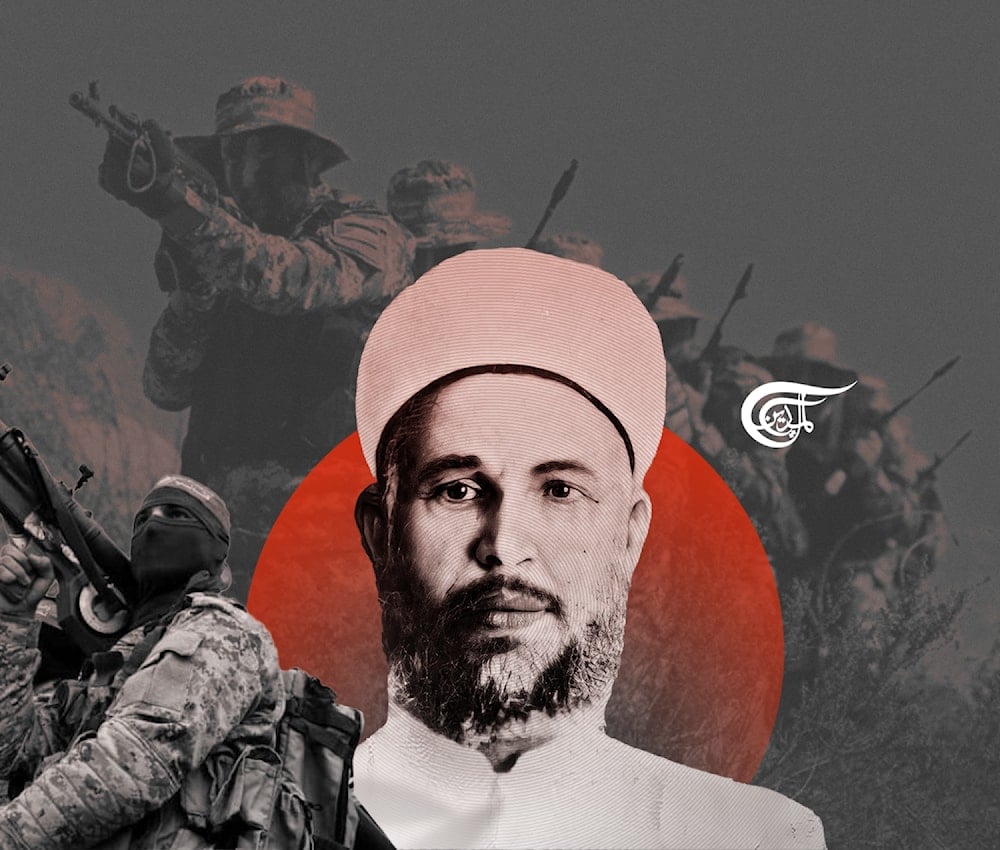The hero who overthrows tyranny: The path of Izz ad-Din al-Qassam
Izz ad-Din al-Qassam's ideas are alive. This is the real philosophy of resistance. The heirs of his values and struggle are now defending the Gaza Strip from the Zionist aggressors.
-

The heirs of Izz ad-Din al-Qassam's values and struggle are now defending the Gaza Strip from the Zionist aggressors (Illustrated by Mahdi Rtail; Al Mayadeen English)
In April 1931, 94 years ago, Palestinian Resistance fighters from the Black Hand movement began conducting operations against the Zionist and British colonial forces in Palestine. The founder of this movement was Izz ad-Din al-Qassam, a man who became a true legend of the national liberation struggle.
Many books and articles have been written about this outstanding man. We can study his personality and biography from several sides at once. Firstly, he was a hero of the early history of the Palestinian Resistance, a leader who raised the banner of rebellion against British colonization and Zionist expansion. Secondly, in a broader context, he was also one of the leaders of the liberation struggle against the French colonialists in Syria (in the period before his move to Palestine). Thirdly, he was a talented organizer and commander of his own unit of warriors, and his tactics and strategy deserve a comprehensive analysis.
When training his Resistance fighters, Izz ad-Din al-Qassam paid great attention to their moral condition. He taught the fighters the principles of piety, modesty, perseverance, the ability to overcome dangers, benevolence toward one's neighbor, and self-discipline. Their faith and firm determination to fight for the liberation of their Homeland from occupation and colonialists were their mainstay.
If we analyze this moral concept of struggle in more detail, we will find several important aspects in it. Al-Qassam strove for his fighters to develop the best qualities of their character and learn mutual assistance and noble deeds.
In my opinion, we can see in this case similarities with the moral philosophy of the great thinker Abu Hamid al-Ghazali, who lived in the 11th-12th centuries. In his writings, al-Ghazali wrote a lot about the moral improvement of man and the importance of virtue, self-education, and good deeds. For him, improvement and the development of positive character traits were the main aspects of the ethical concept that led a person to happiness and a proper life. Izz ad-Din al-Qassam put these ideas into practice.
Let's pay attention to how different these ideas and values are from those that were spread among al-Qassam's enemies. While the prominent Palestinian leader taught his fighters a virtuous, noble, and honest way of life, the Zionist units professed principles of cruelty and bloodthirstiness. For example, the so-called "Special Night Squads" (Zionist punitive detachments), which were created by Britain in 1938, staged attacks on the indigenous Arab inhabitants of Palestine and engaged in torture and extrajudicial executions, using the patronage of the colonial administration.
Socially, Izz ad-Din al-Qassam has always sought to defend the rights of the oppressed inhabitants of Palestine. At the time, Zionist settlers, with the support of British colonialists, actively seized Palestinian lands and regularly staged hostile actions against the indigenous Arab population. The situation of Palestinian peasants and urban residents was getting worse and worse as they were subjected to oppression (including economic). Al-Qassam, observing numerous examples of such injustice in the regions of northern Palestine, embarked on the path of struggle in the name of his people.
He was not afraid to challenge the enemy forces, which were outnumbered. Risking his life, he motivated people and lit the spark from which the fiery force of the Palestinian Resistance was born.
Al-Qassam was a leader who followed the path of the great struggle to the end. In 1935, he died heroically in a battle against the British colonialists. He did not retreat but fought like a lion. And it was this last battle that immortalized him. Thousands of Palestinians mourned the death of a fighter and leader who bravely fought against the Zionists and the British occupation in the late autumn of 1935. And for many future generations, he became an example of indomitable courage.
Izz ad-Din al-Qassam's ideas are alive. This is the real philosophy of resistance. The heirs of his values and struggle are now defending the Gaza Strip from the Zionist aggressors.
The Zionist regime uses tons of bombs, guided missiles, artillery, heavy tanks, and aircraft against Gaza. Civilian infrastructure, such as hospitals, power plants, and food warehouses, are being indiscriminately attacked. In the face of enemy aggression, Palestinian warriors in the Gaza Strip are defending their homes, their families, and their native land. From Khan Younis to Jabalia, from Gaza to Beit Hanoun, from Rafah to Deir al-Balah, Palestinians are courageously fighting against the occupiers.
They are brave people who overthrow tyranny, the very tyranny that the Zionist regime and its allied Western imperialism symbolize. They are continuing the national liberation uprising that Izz ad-Din al-Qassam started, and this is a truly sacred battle that has existential significance.

 Alexander Tuboltsev
Alexander Tuboltsev
 5 Min Read
5 Min Read











